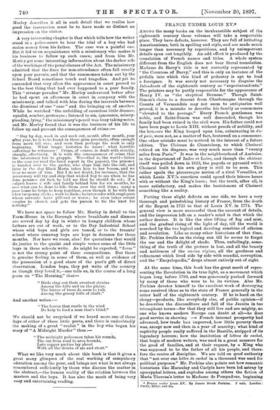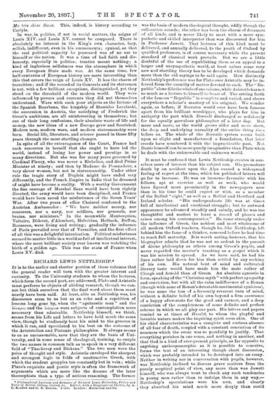FRANCE UNDER LOUIS XV.* AMONG the many books on the
inexhaustible subject of the eighteenth century these volumes will take a respectable place. They have defects, however. They are full of irritating Americanisms, both in spelling and style, and are made much longer than necessary by repetitions, and by unimportant details spun out lengthily. An odd effect is produced by the translation of French names and titles. A whole system different from the English does not bear literal translation. Madame du Barry's title is not correctly represented by "the Countess of Barry," and this is only an instance of the pitfalls into which this kind of pedantry is apt to lead a foreigner. It was surely not necessary to disguise the Intendants of the eighteenth century as " superintendents." The printers may be partly responsible for the appearance of Henry IV. as "the skeptical Bernese." Though Saint- Simon's claim to a descent from Charlemagne through the Counts of Vermandois may not seem to antiquaries well proved, it is a mistake to describe his family as commoners "elevated to the peerage." Every French gentleman was noble, and Saint-Simon was well descended, though his family had been ruined in the civil wars. His father could not have been page to Louis XIII. without proofs of nobility, and the honours the King heaped upon him, culminating in due et pair, were not, as a matter of fact, bestowed on a commoner. One other mistake must be noticed in the interest of a future edition. The Château de Chanteloup, to which Choiseul retired on his disgrace, was very much more than " twenty miles from Paris." It was in the neighbourhood of Amboise, in the department of Indre et Loire, and though the château itself was pulled down in 1823, the pagoda or pyramid which Choiseul built to his own glory is still to be seen. This rather spoils the picturesque notion of a rival Versailles, at which Louis XV.'s courtiers could spend their leisure hours with or without the King's leave; but the truth, after all, is more satisfactory, and makes the banishment of Choiseul something like a reality.
Putting these slight defects on one side, we have a very thorough and painstaking history of France, from the death of the Regent in 1723 to that of Louis XV. in 1774. The general view is more successful than the account of details, and the impression left on a reader's mind is that which the author desires. It is like the slow lifting of fog and mist, and the gradual rising of the light of day, till the world is scorched by the too logical and dazzling sunshine of atheism and revolution. Like so many other historians of that time, Mr. Perkins dwells on the rising sun till he seems to forget the use and the delight of shade. Thus, unfailingly, some- thing of the truth of the picture is lost, and all the beauty and nobleness of the ancien regime, all the goodness and refinement which lived side by side with scandal, corruption, and the "Encyclopaedia," drops almost entirely out of sight.
At the same time, this book has the great merit of repre- senting the Revolution in its true light, as a movement which began long before 1789, and was generously pushed forward by many of those who were to be its victims. Also Mr. Perkins devotes himself to the excellent work of destroying some received ideas as to the state of France generally in the latter half of the eighteenth century. If he is hard on the clergy—products, like everybody else, of public opinion—if he describes the discomfiture and fall of the Jesuits in too triumphant terms—for that they still live and are mighty, no one who knows modern Europe can doubt at all—he does good service in showing ',ow French internal prosperity bad advanced, how trade had improved, how little poverty there was, except now and then in a year of scarcity; what kind of captivity people really suffered in the Bastille, stripped of its legendary horrors; how the institution of lettres de cachet, that bogie of modern writers, was used in a great measure for the good of families, and at their request, by a King who was supposed to be the father of all his people, and there. fore the centre of discipline. We are told on good authority that "not over one lettre de cachet in a thousand was used for political purposes." Mr. Perkins also points out how romantic historians like Macaulay and Carlyle have been led astray by apocryphal letters, and explodes among others the fiction of Maria Theresa's letter to Madame de Pompadour, beginning
• Franc• under Louis XV, By James Brack Perkins. SI vole. London ; Fmith. Elder. and Co. Ma tree there Sceur. This, indeed, is history according to Carlyle.
In war, in politics, if not in social matters, the reigns of Louis XIV. and Louis XV. cannot be compared. There is absolutely no interest in the King's own character, lazy, selfish, indifferent, even in his amusements ; cynical, so that the real political sagacity he possessed was of no use to himself or the nation. It was a time of bad faith and dis- honesty, especially in politics ; treaties meant nothing ; a kind of inglorious selfishness was the atmosphere in which every European State made war. At the same time, few half-centuries of European history are more interesting than this that covers the reign of Louis XV. It has the charm of transition; and if the record of its Generals and its statesmen is not, with a few brilliant exceptions, distinguished, yet they stand on the threshold of the modern world. They were influenced by powers and currents they did not themselves understand. Ware with such poor objects as the fortune of the Spanish Bourbons, the kingship of Stanislas Leczinski, the succession in Austria, the satisfying of Frederick the Great's ambitions, are all uninteresting in themselves ; but out of their long confusions, their absolute waste of life and money, the new ideas of a new Europe grew and flourished. Modern men, modern wars, and modern statesmanship were born. Social life, literature, and science passed in those fifty years through the most startling changes.
In spite of all the extravagance of the Court, France had such resources in herself that she ought to have led the world, instead of losing her power and prestige in so many directions. But she was for many years governed by Cardinal Fleury, who was never a Richelieu, and died Prime Minister at ninety; and then by Madame de Pompadour, a very clever woman, but not in statesmanship. Under other rule the tragic story of Dupleix might have ended very differently, and the French Empire in India that he dreamed of might have become a reality. With a worthy Government the fine courage of Marshal Saxe would have been rightly directed, the army would have been disciplined, and France would have been saved the misfortunes of the Seven Years' War. After two years of office Choiseul confessed to the Austrian Ambassador : " We have neither money, nor resources, nor a navy, nor soldiers, nor generals, nor brains, nor ministers." In the meanwhile Montesquieu, Voltaire, Diderot, d'Alembert, Helvetins, Holbach, Buffon, Rousseau, were living and writing ; gradually the influence of Paris prevailed over that of Versailles, and the first effect of all this was a delightful intoxication. Political misfortunes seemed to matter little in a world so full of intellectual interest, where the most brilliant society ever known was watching the birth of a golden age. This was the state of France when Louis XV. died.























































 Previous page
Previous page